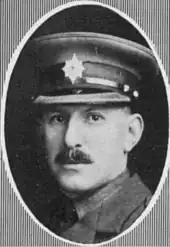C. H. Bovill
Charles Henry Bovill (28 September 1878 – 24 March 1918), professionally known as C. H. Bovill, was an English writer, songwriter and lyricist, known for his collaborations with P. G. Wodehouse, George Grossmith Jr. and others. His career was cut short by the First World War in which he died while serving in the British army in France.

Life and career
Bovill was born at Coonoor, India, the only son of Major Charles Edward Bovill, Royal Inniskilling Fusiliers, and his wife, Ellen Marie.[1] He was educated at Bedford Grammar School, after which he entered the civil service in 1900, serving there until 1912.[2] He married Ethel Rachel Kay at St Augustine's, Fulham on 30 September 1907;[3] they had three sons.[2]
In the early 1900s while still a civil servant, Bovill began writing song lyrics, collaborating with, among other composers, Ernest Shand and Philip Braham.[4] In 1905 his short play Goodbye, Pierrot was given as a curtain raiser in provincial performances.[5] In 1907 he and P. G. Wodehouse contributed lyrics for Seymour Hicks's musical The Gay Gordons.[6] For revues contributed lyrics to George Grossmith Jr.'s Come Inside (1909), and was co-author of Mr Manhattan and Half Past Eight, and was writer of the Theatre Royal, Drury Lane's 1912 pantomime, The Sleeping Beauty.[2]
Among later West End revues of which Bovill was the author were Everybody's Doing It (1912), All the Winners (1913), Nuts and Wine (1914, with contributions from Wodehouse), and Honi Soit (1915).[2] He wrote the words for what was billed as a "vaudeville", The Gay Lothario (1913).[7]
In addition to his theatrical work, Bovill wrote humorous prose for publications including The Globe, where for some time Wodehouse was a colleague. While working on Nuts and Wine they wrote a series of short stories based on Bovill's idea of a young man who comes into a lot of money and finds himself in a succession of adventures.[8] The stories appeared in The Strand Magazine in Britain and The Delineator in the US,[8] and were later published as a book.[9] Other publications for which Bovill wrote short stories included The Grand, Pearson's, The London, and other magazines.[10]
During the First World War, Bovill volunteered for the army and was commissioned as a second lieutenant in the 1st battalion, Coldstream Guards in 1916.[2] He was mortally wounded on 21 March 1918 and died three days later.[11] He was buried in the Duisans British Cemetery, Etrun.[12]
References
- "Charles Harry Bovill", India, Select Births and Baptisms, 1786–1947. Retrieved 24 October 2020. (subscription required)
- "Roll of Honour," The Times, 28 March 1918, p. 4
- "Charles Harry Bovill", London, England, Church of England Marriages and Banns, 1754–1932. Retrieved 24 October 2020 (subscription required)
- "Songs for Low Comedians", The Era, 7 November 1903, p. 23; and "New Music", The Stage, 3 March 1904. p. 9
- "Amusements in Sheffield", Sheffield Daily Telegraph, 13 June 1905, p. 4; and Theatre listings, Folkestone Express, 1 July 1905, p. 4
- "The Aldwych", The Stage, 19 September 1907, p. 18
- "New 'Vaudeville' for the Empire", The Times, 30 August 1913, p. 8
- Jasen, pp. 50–51
- WorldCat OCLC 29267495
- "C. H. Bovill", Who's Who and Who Was Who, Oxford University Press, 2007. Retrieved 24 October 2020
- "Deaths: Died of Wounds", The Times, 28 March 1918, p. 1
- "War Graves of the British Empire", Imperial War Graves Commission, 1925, p. 16. Retrieved 24 October 2020 (subscription required)
Sources
- Jasen, David A. (1975). P. G. Wodehouse: A Portrait of a Master. London: Garnstone. ISBN 978-0-85511-190-8.
External links
- C. H. Bovill at the Internet Broadway Database
- Bovill, C.H. (Charles H.), b. 1878 Library of Congress Performing Arts Encyclopedia
- A Man of Means, Project Gutenberg
- Works by C. H. Bovill at LibriVox (public domain audiobooks)

- Plays by C.H. Bovill on Great War Theatre